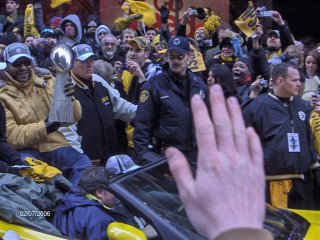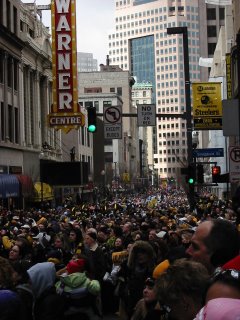Barratry: Shilling the Volokh Conspiracy to a Killer Soundtrack
That said, when I discovered the Volokh Conspiracy, I quickly subscribed to an email service VS offered, each post delivered piping hot (well, actually a couple of hours after posting, sometimes anyway) to one of the two relatively unused inboxes (heh, I said boxes) I use like a plumbing trap to capture various arms-length emails pertaining to commercial transactions and relationships and the occasional mailing list I subscribe to and then often unsubscribe from. I've found that I delete a lot of it; I don't have a lot of time lately, and it seems almost a chore.
There are many blogs I adore, and only a few I can count on myself to stay current one. One is populated by a few meatspace friends who are ultra-sharp, and the other two are creative sites, Zulieka like a journal but of an especially expressive and aesthetically worthy sort, and Flagrant who I consider one of the better post-modern novelists working, or rather is working on one of the better post-modern novels on a near-daily basis, the only problem being that she betrays no overt interest in the book deals swirling around the blogosphere.
For a while, the subject lines didn't reveal anything about the post (author, subject), and I'm pretty sure then, when I was busy, I just deleted the posts en masse. Now, however, the posts are properly labeled and I can see at a glance based on author and topic whether I care to read the post. I cull, selecting all, twenty-five messages at a clip, and then selectively remove the check marks of a few, repeating as necessary until I've deleted everything that doesn't immediately interest me. My reward for the long process of culling my inbox (that just keeps sounding dirty) is a handful of posts to which I have been looking forward, the supper for which I sing, or click.
This week of VC posts reminded me why I haven't cancelled my subscription; there was just too much good stuff, and I'm going to share everything that caught my eye. Requisite tips of the hat to tips of the hat are omitted, but I have included links to those articles VC merely shills itself, as they are, of course,* the thrust. In no particular order:
Volokh himself got all hot and bothered about words this week. On a related note, he shills Dahlia, who writes brilliantly of Anna Nicole Smith's unlikely visit to the Supreme Court:
Today's dispute is about the boundaries between state and federal courts—whether there is a zone outside ordinary federal court jurisdiction known as the "probate exception." (Try dancing naked to that.) Even though federal bankruptcy courts have rather broad jurisdiction, they have, for centuries, butted out in the areas of domestic relations and probate—under the theory that state courts are better-positioned to decide them. The 9th Circuit said the bankruptcy court should butt out here, meaning Anna gets nothing. She appealed, and the Supreme Court granted certiorari, thus making for the happiest crop of law clerks in modern memory.
Jim Lindgren, co-Conspirator, also posts on our favorite TrimSpa spokeswoman.
Turning to the other Conspirators, for those among my friends who are members of Law Reviews, who seek to be members of Law Reviews, who seek to publish in Law Reviews (and any of you feel free to ask Moon once in a while, Are you going to write something or what?), or those whose closest thing to "glory days" are their afternoons spent in law libraries "citing and sourcing," "pulling books," or bluebooking, a series of posts discusses the "sweet spot" for submissions, and the unraveling market for law review submissions (Hoffman at Concurring Opinions as linked by Conspirator, Orin Kerr).
Or you could just go read the site yourself (although the above, believe it or not, is a modest fraction of the post volume over there). For the record, I'm not logging a single trackback for all of the above. I'm no link whore.
And by the bye, as longing as we're acknowledging my technology backwardness (RSS, remember?), months after I bought my new laptop (if 18 months same as cash really qualifies as "buying"), concurrently with which I bought a bunch of blank CD's and jewel boxes, I finally just tonight burned my first CD. This is especially notable since for reasons I won't get into my roommate has anywhere between 500 and 1500 CD's laying around in the next room, many of which I'd like to add to my collection. My first two choices, the second of which I'm about to put in as the first expires, are both Yes albums: Fragile, and Close to the Edge. Lately, I've had the creeping suspicion that while I'd like to stay current, and do have certain growing branches of music I at least casually follow, I'm always going to have a taste for the classic rock I've largely eschewed for the past five or ten years, concept rock, the stuff that really tried. There's plenty of good music out there, no doubt, and I sometimes berate myself for how little I really know, but I just so rarely encounter things that think as big as these old seventies groups did.
This lament has long since been exhausted, but not by me: I think the movement from LP's, with their two sides and severe time limitations, to CD's with their expanding capacities and seamlessness (not to mention the first incarnation of shuffle), moved the focus from full-length albums to individual songs, with effects positive and negative. But I grew up on albums in a hippie household, and in some ways I've never left.
Coming Soon (March 2008): Moon buys an iPod (about which, tying this all together, VC offers a link).
______________________________
* I use "of course" so gratuitously that in formal documents I very require a dedicated of-course pass just to remove every unnecessary usage (to wit, basically all of them (of course)).







